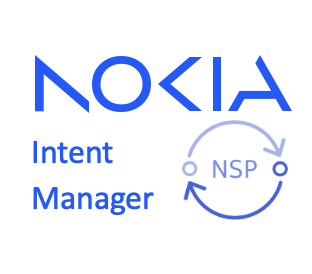This vsCode extension connects to Nokia NSP Intent Manager to facilitate Intent development and delivery.
Warning
Known Issues and Limitations:
- Intent decorations are automatically updated by audit/sync methods to reduce server load. In some error scenarios the displayed alignment state does not reflect the server state. Consider to trigger a manual resync to reload alignment states from the backend server.
process.env.NODE_TLS_REJECT_UNAUTHORIZED = "0"disables SSL verification (not recommended).- Log access (opensearch) is on-demand. Limits apply (check settings).
- No local validation of intent-types. NSP will validate changes during upload/save.
- If running NSP releases 23.11 and prior, some of the functionality may not be supported due to API restrictions
Copyright 2024 Nokia Licensed under the BSD 3-Clause License. SPDX-License-Identifier: BSD-3-Clause Nokia logo is trademark of Nokia
The vsCode extension for NSP Intent Manager allows the user to:
- Virtual remote file system to access intent-types and intents.
- Create, Update, Delete operations for intent-types and intents.
- Download intent-types (including resources).
- Upload intent-types from local file-system (git)
- Code snippets to accelerate coding.
- Retrieve logs from OpenSearch (filtered by intent-types and intents)
- Cross navigate to NSP WebUI in context of intent-types and intents
- Multi-target operations (sync, audit, set-state, logging)
- Deletion of intent-types including intents (confirmation dialogue)
This project is community-driven. This means that support is best-effort coming from the community (i.e. anyone with access to the code extension) and contributions from the community are welcome at any time.
As such, this tool has not been scale tested and it is meant to help in the developer journey with a limited number of intent-types and instances, but it is not designed to work in a production network setup.
Extensive logging is available for all communication between this vsCode plugin and NSP IM. Check "OUTPUT" for more details.
Please make sure, you've got the following installed in your environment:
# npm install -g typescript
# npm install -g @vscode/vsce
Installation can be validated like this:
% npm list -g
/usr/local/lib/node_modules/node/lib
├── @vscode/[email protected]
└── [email protected]
Before you compile and build the distribution, make sure all depended modules are installed:
% npm install .
% npm list
[email protected] ~/dev/vscode-intent-manager
├── @types/[email protected]
├── @types/[email protected]
├── @typescript-eslint/[email protected]
├── @typescript-eslint/[email protected]
├── @vscode/[email protected]
├── [email protected]
├── [email protected]
├── [email protected]
├── [email protected]
├── [email protected]
├── [email protected]
├── [email protected]
├── [email protected]
├── [email protected]
└── [email protected]
To see all dependencies, you can run npm list --all.
In cases of any issues, visit the npm doctor.
To compile and generate the VSIX for installation, run:
vsce package
To configure the extension, you need to configure the following attributes in VsCode Extension Settings.
ctrl+shift+p > Preferences: Open Settings > Extensions > Intent Manager
Intent Manager > Parallel Operations: Enable: Improve performance by running things in-parallel (EXPERIMENTAL)Timeout: Client-side timeout for NSP API callsIgnore Labels: Hide intent-types from the user based on labels (helps to focus)
To connect to an NSP IM, you need to configure the following attributes in VsCode workspace settings:
ctrl+shift+p > Preferences: Open Workspace Settings > Extensions > Intent Manager
NSPIP: IP-address or hostname of the NSP serverUser: NSP username to be usedPassword: NSP password to be used (password is hidden, using vsCode secrets)Port: Usage of port 443 is recommended
See release changes in Changelog.
Enjoy!
